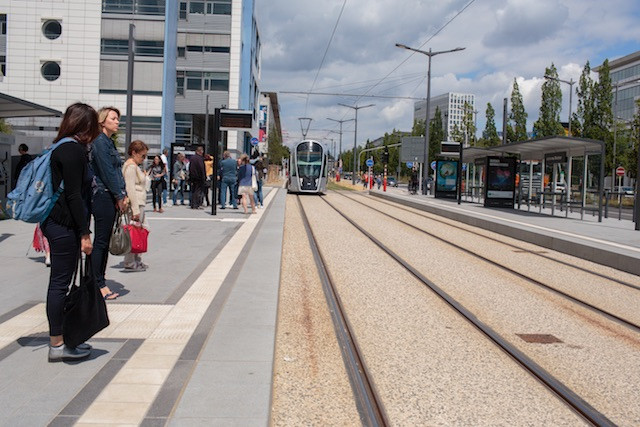The country’s population may be pint-sized, but congestion is an integral part of daily life. Partly because of its dependence on cross-border workers (over 190,000 people working in Luxembourg live in France, Germany or Belgium) and its love of cars, the situation is compounded by the fact that being in the heart of Europe means many attractions are a short drive from the grand duchy.
That doesn’t mean you cannot live without a car, especially in Luxembourg City. In addition to the countless bus routes that cut through the capital, there’s the tram in Kirchberg, which will eventually stretch as far as the Cloche d’Or, in the south of the city. People travelling to either district can also take advantage of the train, thanks to new stations in Pfaffenthal and Howald.
If making a short journey nowhere near a train or bus station, book a web taxi or try a CFL flex car short-term carpooling scheme or Luxembourg’s Carloh cars. The capital is a very walkable city but for those who like to reach their destination slightly more quickly, cycling is commonplace. The capital has a network of cycle paths and the Vel’oh! bike rental scheme will this year be upgraded to include electric bikes, helpful for those hellish hills. There is also a nationwide cycle network and bike schemes in other parts of the country, like Esch-sur-Alzette.
If you still think you need a car, bear in mind that you can get a €2,500 tax allowance on the purchase of a plug-in hybrid or electric vehicle. If bringing your own car from abroad, remember to register it and take it for an annual roadworthiness check, called the “contrôle technique”, at the SNCT centre. And don’t forget to invest in winter tyres; driving with them in snowy or icy conditions is required by law.
Buying your bits
Luxembourg City is excellent for shopping if you like expensive brands with luxury stores in the centre. The more price-driven among us however will find more variety and value over the border. But, one thing the country does well is sustainable alternative stores.
For clothing, I like to browse Akabo Buttek, which offers funky clothes that are fair-trade and made from organic fibres. Not all manufacturers have physical stores and you can find more like Impashion on the fashionrevolution.org site.
When it comes to organic groceries, in addition to organic German chain Naturata and French chain Naturalia, two of my favourite independent shops are Mullebutz, a stone’s throw from Delano HQ in Bonnevoie, and Nature Elements, an oasis in the unlikely setting of an industrial zone in Howald. Packaging-free grocery store Ouni, in rue Glesener, is also big on organic--just remember to bring your own bag! If you are vegetarian/vegan or suffer from food intolerances, you can generally find alternatives in most big supermarkets.
Shoppers can get their fix of British or Irish produce at Home from Home on the route d’Arlon (Strassen) and Eirelux stores in rue des Bruyères (Howald). There are also a number of Indian groceries, Arabic and Southeast Asian stores in the Gare district of the capital, and Scanshop in Neudorf for all things Nordic.
Doctor, doctor
One of the handy things about Luxembourg is that if you don’t like one doctor’s diagnosis, you can go and see another one. That may breed a nation of hypochondriacs, but it means you can get a last-minute appointment with a GP. Doctena.lu removes the headache of finding a GP or specialist doctor nearby who speaks your language and who has availability. Most care is partially or fully subsidised, depending on your insurance, but you will have to pay first and claim a refund later.
A+E services in hospitals offer excellent care for emergencies but expect delays and always ring 112 in advance to find out which hospitals are receiving patients. If you’re not suffering from anything as serious as a broken limb, try one of the three Maisons Médicales de Garde (after hours medical clinics)--in Luxembourg City, Esch-sur-Alzette or Ettelbruck--which are open weekends, nights and on public holidays.
For athletes who injure themselves doing sport at the weekend, the Clinique du Sport at the CHL Eich has a drop-in session with sports trauma experts open early on Monday mornings. You don’t have to be an elite sportsperson to benefit but you do have to be patient as there is often a queue.
Communes
Depending on where you live, administrative procedures may differ. Luxembourg has 105 communes, so it’s hard to generalise about all rules. In addition to registering residents, officialising weddings and coordinating social and cultural activities, communes coordinate waste and recycling schemes.
Most plastics and metals go in the Valorlux blue bags which are collected regularly by the communes. Some things, like yoghurt pots and plastic bags, can be placed in the 15 Re-box containers around the country. Old batteries, ink cartridges and light bulbs can go to the SuperDrecksKëscht collection points, found at most communal recycling centres. Check with your commune for arrangements related to paper, glass and organic waste recycling.
